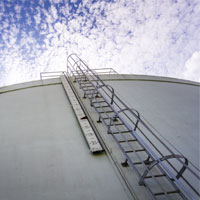 Utilities boss sees fiscal path for new plant
Utilities boss sees fiscal path for new plant
STORY BY LISA ZAHNER (Week of April 17, 2025)
Water-Sewer Director Rob Bolton has figured out a way to move forward with Vero’s new state-of-the-art sewer plant despite the city’s current financial and credit challenges.
Bolton now plans to wait until 2026 – when the city’s audit troubles will have hopefully passed – before seeking an estimated $140 million in bond funding to finance the portion of the $177 million project not expected to be covered by state or federal grants.
In the interim, Bolton said the utility will borrow $75 million at 4 percent interest from a bank so that site preparation, laying of connecting lines and foundation work can begin this summer.
“That will get us through the first year, or year and a half and then we’ll look at doing the bond,” Bolton told the Vero Utilities Commission on April 8.
Vero Beach failed to complete and file its 2022-23 audit on time, falling out of compliance with state law. Since the audit is still in progress, the most recent audited financials available for potential lenders to examine right now date back to the 2021-22 fiscal year.
Utilities Commission Member Tracey Zudans said she was concerned about how the city’s current financial reporting issues might impact Vero’s ability to get a $140 million bond.
“Right now, without the audits done, it would be very difficult if we went out to the bond market. So we're not planning on going out to the bond market,” Bolton said in response to a question from Zudans. “We need to borrow short-term.”
Bolton expressed the hope that if Vero goes to the bond market in 2026, and “we have our audits done, we have an engineering report, we have a financial report all in line, and we have council action in an ordinance that says we're going to be able to pay back this debt service, then you'll get a favorable bond market.
“If you went out there right now without all those things and all the stars aligning, you’re not going to do well,” Bolton said.
The big unknown at the moment is what interest rates will be in 2026 when Vero goes out for that bond – Bolton said the going rate is 4.5 percent right now – and how that will impact the need to raise water and sewer rates to pay off the debt.
Former finance director Cindy Lawson used to work closely with Bolton on utility rate projections and rate increase calculations. But now, as to not be dependent upon the city’s beleaguered finance department for producing this data in a timely manner, Bolton has hired a financial analyst to work directly in his department.
Using the same software that rate consultants use, Bolton said, his new financial analyst will be able to plug all the data on construction, operating and financing costs into the computer to produce a proposed rate structure to bring before the City Council, likely this fall, for new rates which could go into effect in January.
“The new plant is going to cost roughly $40 a month to each wastewater customer for the construction of the new facility,” Bolton said, noting that about $20 per month of that has already hit ratepayers’ monthly bills, with an estimated $20 more in increases to come, starting in 2026.
That $20 per customer per month increase, to be phased-in over four years, assumes a static number of subscribers. But if all the people in Vero’s utility territory still on septic systems connect to the sewer system to share the load, the average per household increase will be less, Bolton said.
There was some good news, as Bolton told the Utilities Commission that the federal grants Vero is hoping for to help build the plant are apparently not impacted by the State of Florida’s enforcement action against Vero Beach for failing to complete and file its 2022-23 audited financial statements.
Bolton said the federal grants are leftover COVID-era money that must be spent on a tight timeline before it expires. The state grants are construction reimbursement grants which the city cannot use until it has construction expenditures to be reimbursed.
Bolton also said the debt on the city’s deep-injection well will be paid off in 2030 and that will help keep utility rates down.



